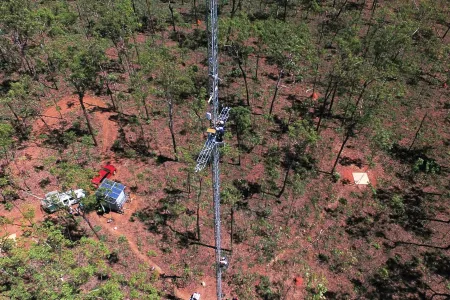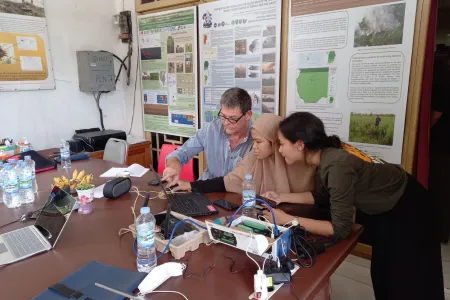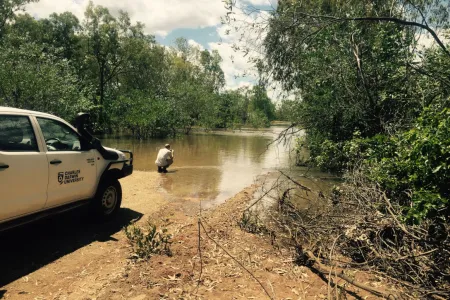Our focus
North Australian landscapes are ancient, culturally and ecologically unique as well as being largely intact with a high degree of functionality. However, land and water development pressures and climate change process will change ecosystem function. RIEL’s Landscape water and carbon dynamics group examines the productivity and water use of land systems in a range ecosystems across north Australia and Indonesia. The research examines impacts of land use and climate change on ecosystem processes to inform decision making processes and ecosystem management.
Specialist expertise
We use a combination of methods to better understand water and carbon cycles in tropical ecosystems – tropical savannas, rangelands, vine forests, wetlands, pasture and croplands, through to mangroves and peat forests. This involves linking ecological, physiological, micro-meteorological (eddy covariance), stable isotopes, remote sensing and modelling approaches to examine how our landscapes respond to environmental change, be it human induced or climate change.
Meet the team
Group Leader
Group members
Mr Matthew Northwood
Dr Rafael Bohn Reckziegel
Dr Benjamin Brown
Mr Adam Bourke
PhD Students
Áine Nicholson
Madeline Goddard
Andrew Esparon
Adam Rexroade
Frederika Morout
Honours
Emma Daly
Robert McGregor
RIEL and CDU Affiliates
Dr Clement Duvert
Dr Francesco Ulloa-Cedamanos
Dr Dylan Irvine
Dr Natalie Rossiter-Rachor
Dr Rachel Groom
Prof Natasha Stacey
Dr Andrew Edwards
Dr Richard Crabbe
Former students
Linda Luck
Vanessa Solano
External collaborators
Australia
Professor Jason Beringer (UWA)
Professor Sam Setterfield (UWA)
Professor Michael Douglas (UWA)
Dr Shaun Levick (CSIRO)
Dr Tanya Doody (CSIRO)
Dr Sébastien Lamontagne (CSIRO)
Mr Andrew Taylor (CSIRO)
Prof Michael Bird (JCU)
A/Prof Lucas Cernusak (JCU)
Dr Norman Duke (JCU)
Dr Jamie Cleverly (JCU)
Dr Cassandra Rowe (JCU)
Dr Sigit Samsito (TropWater, JCU)
Dr Samantha Grover (RMIT)
Dr Deepak Gautam (RMIT)
Prof Catherine Lovelock (UQ)
Dr Clint Cameron (UQ)
Dr Pandora Hope (Bureau of Meteorology)
International
A/Prof Simone Fatichi (National University of Singapore)
Dr Stan Schymanski (Luxembourg Institute of Science and Technology
Prof Christian Birkel (University of Costa Rica)
A/Prof David Butman (University of Washington)
Prof Daniel Murdiyarso (CIFOR, Indonesia)
Dr Laura Graham (BOSF, Indonesia)
Organisations
Research Institute for Northern Agriculture (RINA, RIEL)
Terrestrial Ecosystem Research Network (TERN)
Northern Institute (CDU)
Resilient landscape - National Ecosystem, Science Program (NESP, UWA)
NT Government Department of Environment, Parks and Water Security
FluxNet
iLEAPS
Why this research is important
Understanding climate and land use impacts on water and carbon cycles helps us understand how productive our lands systems are, and how this may change in the future. This is key knowledge to sustaining functioning environmental and cultural landscapes.
We track the movement of carbon from the atmosphere to landscapes ad measure net sequestration and quantify losses via respiration, fire and export to the ocean and atmosphere via streams and rivers. This informs conceptual and mathematical models of these processes as they operate in the tropics. With this understanding we can contribute to decisions associated with developing water resources in northern Australia, or changes to carbon sequestration rates, greenhouse gas emissions and offset potentials with land use interventions.
Our group works closely with RIEL’s Top End Hydrology Lab, Weed management group, Freshwater, estuarine and marine ecology, Tropical savanna ecology and Communities, livelihoods and natural resources groups.
Key achievements and impacts
- Quantify savanna woodland carbon and water balances
- Assess plantation forestry impacts on water balance in landscapes of the NT
- Demonstrate the CO2 fertilisation effect and how it is changing savanna woodland productivity and water use efficiency
- Assess groundwater dependency of woodlands and riparian ecosystems in the NT
- Detail drivers of mangrove dieback across the Gulf of Carpentaria (NT and Qld)
- Track water use and productivity of restoration of coastal and peat forest systems
Key projects
- North Australian Tropical Flux transect –The North Australian Tropical Transect (NATT) traverses 1000 km rainfall gradient of largely intact savanna vegetation which provides an ideal ‘living laboratory’ and framework to investigate the influence of vegetation structural and floristic change and climate drivers on land–atmosphere exchange at a regional scale. We are conducting a multidisciplinary program examining carbon, water and energy fluxes as a function of climate and vegetation change along a sub-continental environmental gradient. Funding Terrestrial Ecosystem Research Network (Ecosystem Processes)
- Linking terrestrial–aquatic fluxes to rectify the Australian carbon balance – With RIEL’s Top End Hydrology Lab, we are assessing the fraction of carbon that was previously thought to be stored in terrestrial ecosystems in Australia but actually leaks into streams and rivers. Through integration of high-resolution river chemistry and gas measurements, remote sensing and statistical modelling, the project will enhance our understanding of the links between terrestrial carbon sequestration and aquatic carbon export to correct estimate of net carbon sequestration potential across Australian biomes, especially tropical system where there is almost no data describing these processes. Funding: ARC Discovery Project Duvert et al. DP220100823.
- Assessing blue carbon’s potential as emissions offset in north Australian landscapes. Funding: INPEX, Northern Institute


